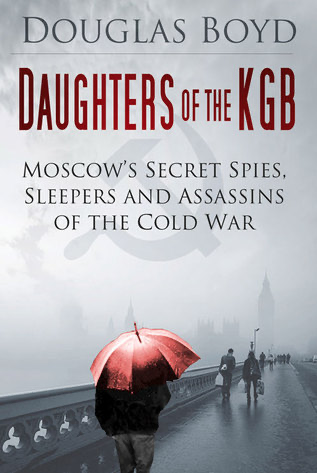Daughters of the KGB: Moscow’s Secret Spies, Sleepers and Assassins of the Cold War by Douglas Boyd
My rating: 3 of 5 stars

The year is not over despite me starting to post summation articles on this blog.
A gracious gift from Cyril of Douglas Boyd’s Daughters of the KGB has provided a most excellent Stephen’s Day read – despite it promising potentially rather bleak and sombre subject matter. Boyd – himself a victim of East Block counter-espionage efforts, provides an overview and operational analysis of the various security services active in the Eastern Bloc/Warsaw Pact countries following the conclusion of WW2.
He does an excellent job of establishing the context for each country’s service with quick thumbnail sketches of their unique experience before WW2 and leading to their existence under Societ domination in the subsequent new world order. The book begins with a well-scoped and delivered look at Stalin’s position at the end of WW2 and where he looked for global geopolitical advantage. East Germany (Boyd’s nemesis) received disproportionate attention) followed by the other protagonists in the sequence are examined for how close they were tied to Soviet control and evidence presented looking to individual experiences for colour.
The area of this work’s attention is an excellent topic for exploration – although I would argue that the title is somewhat misleading in terms of eventual delivery – a lot of promise there and a great cover by the way.
The author has framed the broader book in light of his own experience. Despite substantial research, compilation, and bringing to light an illustrative swath of personal stories, it does in my opinion, suffer from a lack of a good editor. There are great tales, and all the notable individuals are highlighted, but there is an overall lack of focus that would provide an identifiable and engaging arc to the presentation. It seems somewhat anecdotal in presentation, with colourful vignettes, but each seems to lack a helping illustration of what this illustrates about the regime being questioned. This is probably best demonstrated by the decreasing lack of detail and attention to specific countries as the book teeters to a close. Albania, for example, gets a scant 5-page treatment from King Zog to the demise of the Maoist Enver Hoxha – yet also contains the privileged conclusion to the book – a single paragraph that does not and could not pull it all together.
Ultimately, there is rich primary material here, some of which is presented very well. However, it lacks an overall structure aside from chapter headings assigned to specific countries, seemingly not attempting to derive broad conclusions from the exploration.
There is rich material for a random read here, but in the end, a sense of missed potential.
